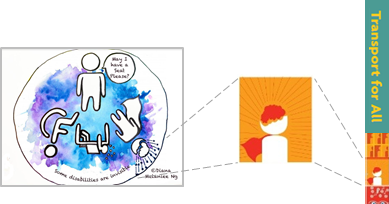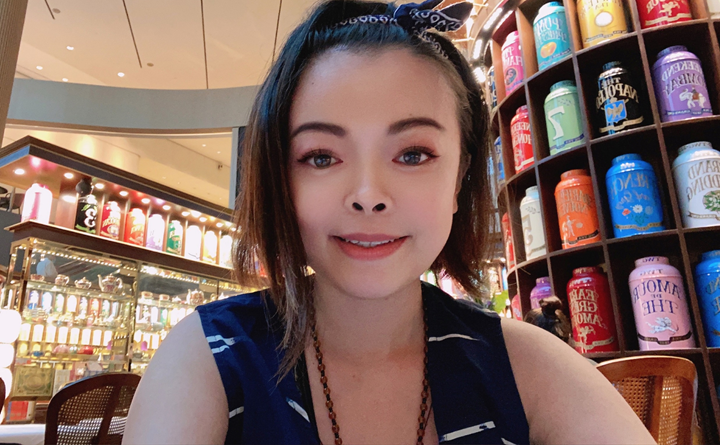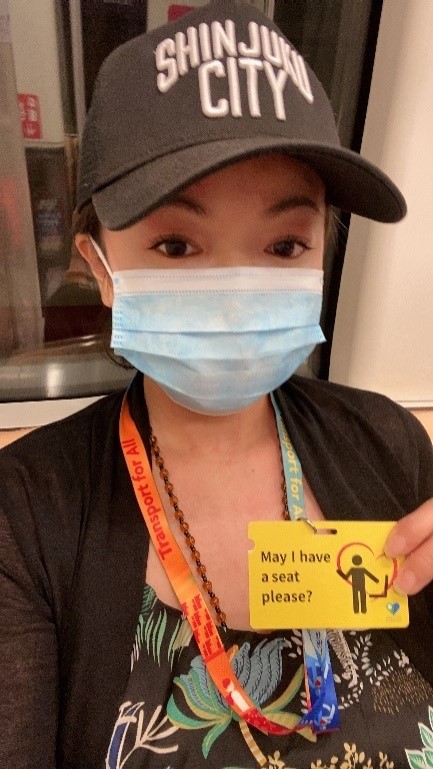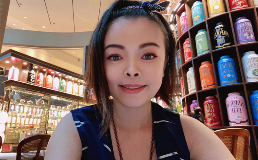Government officials will NEVER ask you to transfer money or disclose bank log-in details over a phone call. Call the 24/7 ScamShield helpline at 1799 if you are unsure if it is a scam.
In the Spotlight
Discover true stories of inspiration, inclusiveness and care
Share With Us!
Meet Diana Ng, A Commuter With Invisible Needs

38-year-old Diana Ng got in touch with the Caring SG Commuters Committee through her artwork submission for the “Art for Inclusivity” competition.
Her submission was one of the top 10 artworks and elements incorporated into the final design of the “May I have a seat please” lanyard.

We sat down with Diana, who shares more about her story and her thoughts on taking public transport as a commuter with invisible medical conditions.
Hi Diana, could you share more about yourself?
Diana: I am a caregiver of someone diagnosed with Autism Spectrum Disorder (ASD) and so, I understand how tough and tiring it is for caregivers to shuttle ASD children around for their therapy and classes.
Often, we do not get seats on the public transport because some ASD children look "normal" too, but their behaviours can sometimes be misunderstood.
At the end, it is entirely just about tired children and caregivers who need seats or helping hands instead of judgements and stares.
In mid-Nov 2020, I was diagnosed with Dermatomyositis (DM) with manifestation of Nonspecific Interstitial Pneumonia (NSIP) Interstitial Lung Disease (ILD), Arthritis, Myositis, Reynauds & Sclerodactyly. Since then, I hardly step out of my house.
DM is a rare auto-immune disease with long-term inflammatory disorder which affects skin and the muscles, typically starting with a reddish-purple rash, which can be itchy and painful. The rash may appear on the eyelids, cheeks, nose, chest, back, elbows, knees and knuckles. Muscles usually become weak and sore progressively, making it difficult to perform everyday movements, such as lifting an object or rising from a chair. Over time, there can be muscle loss.
DM can also cause breathing problems, cardiovascular disease, connective tissue diseases, such as lupus, and may increase the risk of developing cancer.

What are some of the challenges you faced when taking public transport?
Diana: I am currently on Cellcept, a prescription medicine which suppresses and lowers my immune system, making it difficult for me to go outdoors.
Together with the other medication I take, I often experience side effects such as dizziness and muscle aches.
I am also prone to rashes and hives on my face and body because of DM. Coupled with the need to wear masks due to the current pandemic, it makes it more inconvenient to go out.
Sometimes when I am travelling on public transport, I find it hard to get a seat as I look "normal" and young to others, as my giddiness does not show physically.
The rashes and hives also do not show up most of the time unless I get an allergic reaction or too much sun exposure. The muscle aches, chronic fatigue and pain that I get are also “invisible” symptoms.
Sometimes, I cannot grab on things with much strength, such as the handlebars or poles on buses and trains, and would need help opening an umbrella or certain cans/bottles.
How do you hope other commuters will help? How can other commuters understand your experiences?
Diana: Through my artwork, I hope to educate and advocate for people with rare and hidden diseases, where there are certain symptoms that do not show up physically, so as to better seek understanding from fellow commuters.
Also in my case, just because I look young and normal, it does not mean I am not suffering from any side effects of medications or any existing condition flare-ups that I have no control of.
There are also many other people with auto-immune diseases that have such “invisible symptoms” like me too.

About the “May I have a seat please” initiative
Working with the community and commuters, the Caring SG Commuters Committee strives to create a caring, welcoming and inclusive public transport environment.
The “May I have a seat please” sticker, lanyard and card identifier will help commuters with invisible medical conditions, just like Diana, by alerting other commuters that they need a seat.
These identifiers may be obtained from the Passenger Service Centres at MRT stations, bus interchanges or TransitLink Ticket Offices from 26 April 2021.
For further enquiries about the initiative, please contact LTA-TransportForAll@lta.gov.sg.
Discover more inspiring stories and share your own experiences with caring commuters at www.caringcommuters.gov.sg/community
